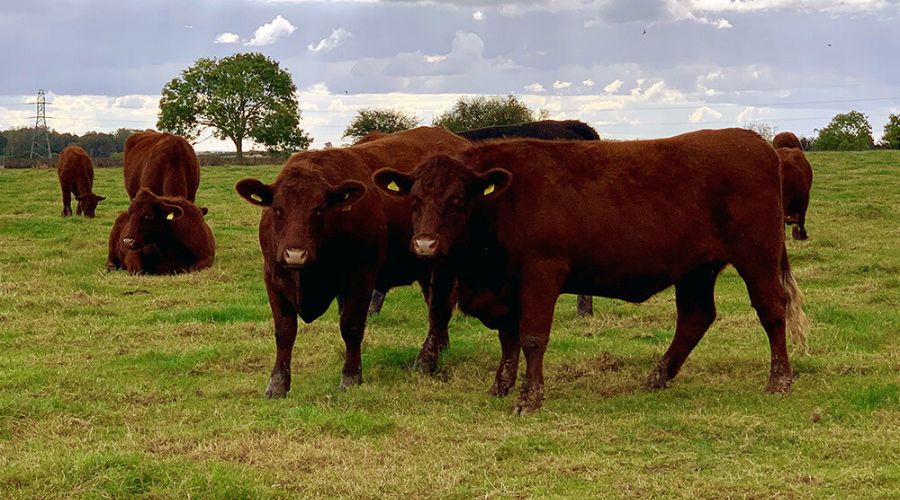AI-powered £1.2m project aims to transform UK beef farming
21st October 2024
UK beef farming could be radically transformed thanks to new research that aims to tackle the industry’s critical environmental, social and economic challenges using artificial intelligence.

The £1.2 million UKRI-funded BeefTwin project seeks to improve feed efficiency, reduce greenhouse gas (GHG) emissions, enhance animal welfare and increase profitability for farmers.
Led by Professor Xiao Ma, director of the Centre for Business and Industry Transformation (CBIT) at Nottingham Business School, part of Nottingham Trent University, the research will combine expertise in biosciences, environmental sciences, management sciences, computer sciences and animal sciences.
Experts from the University of Nottingham, Royal Holloway University, the University of Sheffield and the University of Lincoln will work across disciplines to leverage AI and data-driven technologies to address the urgent challenges facing the UK beef industry.
AI-powered DigitalTwin
Project initiators explained that beef farming significantly contributes to global greenhouse gas emissions, with annual emissions totalling four billion metric tonnes.
UK beef farms also face low profitability due to factors like inconsistent beef quality, lack of precision farming practice, power imbalance and loss of value within the supply chain.
In addition, grazing beef farming makes it difficult to collect real-time data on animal health, feed conversion, and environmental impact.
BeefTwin will develop an AI-powered DigitalTwin for each cow in the herd, creating a virtual representation of the farming system that involves the usage of real-time data, simulation, machine learning and real-time tracking of emissions.
Scientists on board
This unique project will integrate the expertise of scientists from different disciplines to measure conversion rates taking place on the farm and develop a more efficient model through reconfigured farming practices, the experts added.
It will include biology-focused microbial analysis of cattle waste to understand feed conversion to productivity in terms of meat and methane emissions, as well as environmental science-centred analysis to track methane emissions and identify their sources using drones, sensors and methane analysers.
The scientists will also be working closely with farmers to identify the wider socioeconomical issues and different grazing patterns of the cattle and assess the impact on productivity and efficiency of the farm.
Computer science and AI-centred study will be used to leverage sensor and computer vision data to empower precision measurement on cattle weight, behaviour, growth patterns, farming practice variations and methane emission tracking.
A management sciences-centred team at NTU shall alos closely monitor the changing dynamics of the farming practices from data and create a new reconfigured smart farming model representing efficient and optimised conversions that benefit the entire farming value chain.
The results will contribute to the development of new farming practices where operations are simulated and optimised to improve resource efficiency and profitability for farmers.
This will lead to reduced GHG emissions from the farm, improved feed conversion efficiency as well as increased beef farming productivity, enhanced animal welfare and reduced calf mortality rates.
The BeefTwin project aims to collaborate with farmers, policymakers and industry experts throughout to ensure practical and impactful solutions.
Better future for beef farming

Director of CBIT and project lead, professor Xiao Ma, said: “The beef industry in the UK and Europe is facing a number of challenges and competition from smart farming nations such as South America and Southeast Asia, where they have upskilled rural communities and seen their profitability increase.
“Due to yield-driven beef grading, the industry’s low margins and value being extracted later in the food supply chain, for example by supermarkets and abattoirs, UK farms often rely on subsidies to survive, and authorities are required to finance the industry.
“We are seeing a worrying trend where industries are being outsourced to other countries, and if we don’t act quickly, we risk losing beef farming to the same fate. The UK needs to catch up and if we do it right, then we can protect our small farm model and keep local people in their farms by improving the value chain and making farming self-sustainable.
“By fostering collaboration and innovation, BeefTwin aims to create a more environmentally friendly, economically viable, and socially responsible future for beef farming.”
BeefTwin – AI-powered Digital Twin for Sustainable Beef Farming will work with farms across the UK for two years, if you are interested in taking part, please contact cbit@ntu.ac.uk.
Read more livestock news.




